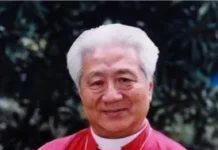Release international is warning of a new threat to religious freedom in Sudan, following a military coup in the country this morning [October 25].
According to news reports, the military arrested the Prime Minister and civilian leaders of the transitional government, which was pledged to lead the country into democracy, following the ousting of Sudan’s dictator Omar al-Bashir. Within hours, it had dissolved the government.
An earlier coup attempt was foiled last month. According to observers, those behind it included loyalists to the former dictator and hard-line groups linked to banned Islamist organisations calling for the overthrow of the civilian government.
Threat to freedom
Sudan’s transitional government took significant steps towards increasing freedom of religion. They determined that Islam would no longer be the state religion and abolished the death penalty for apostasy – converting from Islam to another faith.
Islamic law was imposed by the Sudanese dictator Omar El Bashir after he seized power in 1989. Al-Bashir has been indicted for war crimes in Darfur by the Hague.
In that growing climate of intolerance towards Christians, some churches were closed, demolished, and burnt down. Christians who shared their faith with Muslims risked being accused of incitement to apostasy or blasphemy. Some Church leaders were arrested.
That background intolerance has continued, even under the transitional government. In January 2020 three churches that had just been restored after being set ablaze were again burnt down. Other churches that had been forced to close had yet to reopen.
‘A window of opportunity towards religious freedom in Sudan could be about to close,’ warns Paul Robinson, CEO of Release International, which supports persecuted Christians worldwide.
‘Genuine concern’
‘Release International has long been calling for full religious freedom in Sudan – and will continue to do so. We need only glance back a few years to Sudan under a hard-line Islamist government, to be genuinely concerned about what Sudan could be like again.’
Sudan was declared an Islam-only state by the dictator Omar al-Bashir when he seized power 32 years ago in 1989. Yet, according to Pew Research Centre, the country’s 1.8 million Christians make up 5.4 per cent of the population.
Al-Bashir’s government destroyed churches, arrested pastors, and bombed Christians in the Nuba mountains, where partners of Release International were providing humanitarian aid.
Under his military government it became illegal to convert to Christianity, and students faced arrest for even discussing their religious beliefs.
Meriam
In 2014, Sudan sentenced a woman to death for marrying a Christian man. Meriam Yahia Ibrahim Ishag had been raised in her mother’s Christian faith and claimed to have been a Christian all her life. But because her father was a Muslim, it was alleged she had committed apostasy from Islam.
Under Islamic law marriages between Muslim women and non-Muslim men were forbidden. Meriam was arrested after one of her relatives claimed she had committed adultery by marrying a Christian man.
A court ordered her to abandon her Christian faith, but she refused. Even though she was pregnant she was thrown into jail. She gave birth behind bars and was eventually released on appeal.
Accused of spying
Release International associate Petr Jasek was jailed in Sudan for attempting to gather evidence about church destruction. He was accused of spying and thrown into a cell with members of Isis.
To help others understand the situation in Sudan he told his story in the book Imprisoned with Isis. And Artless Theatre Company is currently touring the UK with the production of that story called If Prison Walls Could Speak. Petr Jasek’s book and details of the theatre tour are available here from the Release International website.
‘Christians believe that Christ gave his life for our freedom,’ says Paul Robinson of Release International. ‘Sudan had taken significant steps towards freedom: freedom of religion and democracy with the transitional government. Please pray that those most basic freedoms: that citizens should be able to choose who will rule their country, and to decide for themselves which faith they wish to follow, will be upheld in Sudan.’



